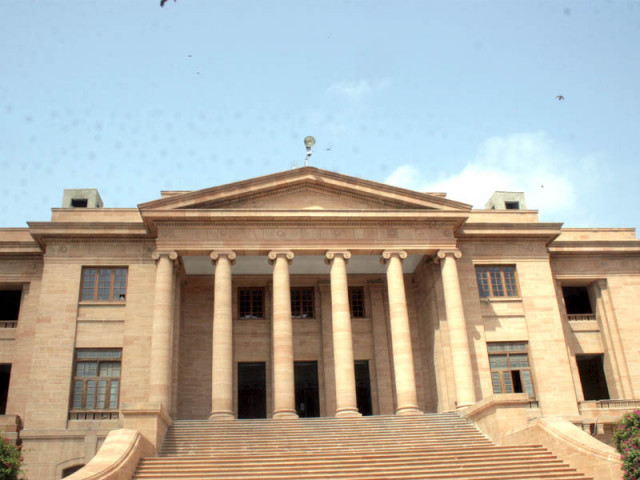SHC orders Sindh govt to pay blood money on behalf of poor prisoners
Chief secretary assures that the money would be paid within 10 days

PHOTO: EXPRESS
A two-member bench, headed by Chief Justice Ahmed Ali Sheikh and comprising Justice Omar Sial, heard the petition regarding the release of 35 prisoners who had not paid the blood money. The court remarked that the poor prisoners should be released after the payment of blood money on their behalf.
The chief secretary assured the court that the money would be paid within 10 days after the approval by the committee comprising Local Government Minister Saeed Ghani and other ministers. The CJ asked why the money could not be paid today instead of ten days. He said that perhaps the chief secretary can also spend a day inside the jail. "Then you will come to know what it is like," the court said.
The CJ remarked that if the government can issue funds for bungalows and personal advertisements, then why not for poor prisoners. He added, "Don't know how many prisoners have died inside the jail waiting for their release".
The court also directed to formulate laws for the payment of blood money and to determine the ages of the prisoners.
Federal Human Rights Secretary Javeria said that the age limit of prisoners, who are eligible for release, is being reduced to 40 years instead of 60 years. The court remarked that the Centre and the province should resolve the issue together and added they would not be closing the case.
SHC directs Centre to amend Diyat laws to facilitate poor prisoners
NAB report rejected
The same bench, hearing the case of a fake call-up notice sent by the National Accountability Bureau (NAB) to a citizen, Shamshad Ali, rejected the report submitted by NAB Intelligence and Deputy-Director Afsar Gul Afridi.
The report maintained that after the call-up notice was issued, the accused was called from the registrar's office in accountability court, Hyderabad. The police are also investigating this issue. NAB investigation officer (IO) does not issue call-up notices to anyone directly.
The court summoned the NAB director-general to appear before the court on April 16. While taking NAB's record register in custody, the CJ remarked that the record register submitted in the court was also misleading and seemed as though it was prepared just yesterday.
The court remarked that a case pertaining to the kidnap of a citizen was registered against Afridi and as soon as it was registered, he got himself transferred to Islamabad on his own request.
NAB prosecutor argued that the NAB has investigated the issue and the call-up notice hasn't been issued by NAB. To which, the CJ questioned how it was possible that the NAB committed a crime and decided to investigate it by itself? He asked why the Federal Investigation Agency should not be ordered to investigate against NAB.
NAB prosecutor said that the court may order investigation of the case through anyone, as it deems fit. He added that the Inter-Services Intelligence can also be asked to look into the matter and investigate it and NAB wouldn't have any issue. On this, the CJ scolded the prosecutor and told him to keep quiet.
Notices issued
The SHC issued notices to the Sindh government, Sindh IGP, law secretary and others seeking reply by April 26 on the plea filed seeking a ban on gutka by a cancer patient, Naseem Haider. A two-member bench comprising Justice Muhammad Ali Mazhar and Justice Agha Faisal heard the plea in which the court inquired what the petitioner wanted, a compensation or medical treatment.
The counsel for the petitioner, Muzamil Mumtaz Mayo, said that the government should provide compensation to his client. Mayo maintained that gutka was still being sold openly all over the city and his client had become a cancer patient due to consumption of gutka, but, he added, Haider does not have enough money for his treatment.
He said that the police don't arrest the people involved in the sale of gutka and if they ever do get arrested, the courts release them on bails. Nobody cares that people are dying by eating gutka, he added. He further said that a report should be sought from the IGP about how many gutka manufacturing machines have been confiscated by the police. He said that the gutka factories in Karachi are running with the police's support and added that the court should instruct the Sindh IGP, DIG and SSP that the FIRs regarding gutka should be filed under Section 336 of the Pakistan Penal Code (PPC) under which the offence is unbailable.
The court sought replies from the East judicial magistrate, Korangi investigation SSP and Zaman Town IO.
Death sentence commuted
The SHC rejected the plea against the death sentence awarded to a criminal, in a case regarding a marriage proposal that led to murder. A two-member bench, comprising Justice Naimatullah Phulpoto and Justice KK Agha, was hearing the case in which the court announced the verdict and commuted the death sentence awarded to the convict, Asif Muneer, with life imprisonment and annulled the sentence of life imprisonment awarded to the co-accused, Seema Mulook, by an anti-terrorism court.
According to the police, the accused had killed the deceased, Samiullah, in FB Area in 2013. The police had arrested the accused from the place of incident in injured condition. The accused were in conflict with the deceased over a marriage proposal.
Published in The Express Tribune, April 13th, 2019.



















COMMENTS
Comments are moderated and generally will be posted if they are on-topic and not abusive.
For more information, please see our Comments FAQ